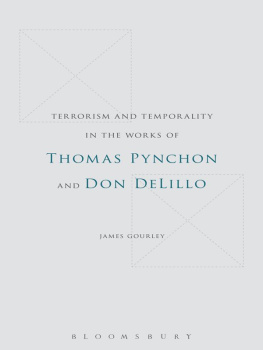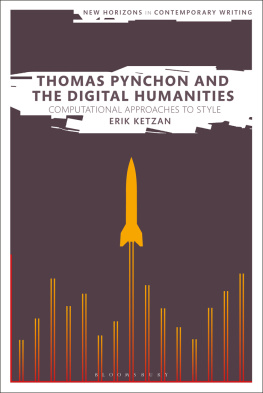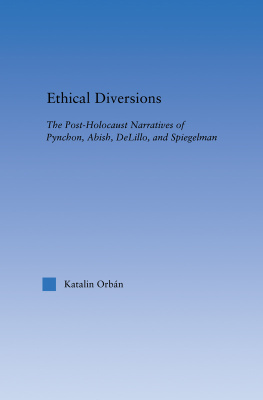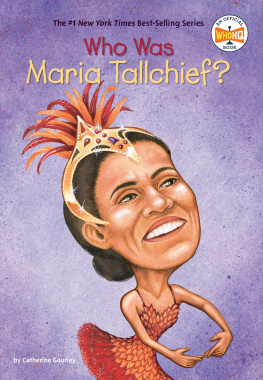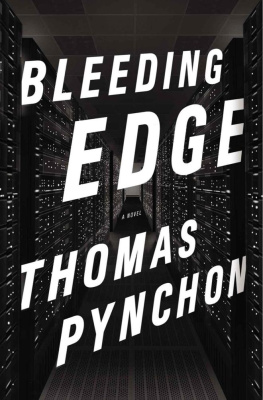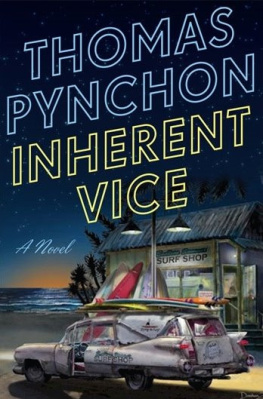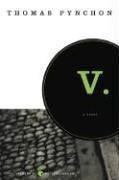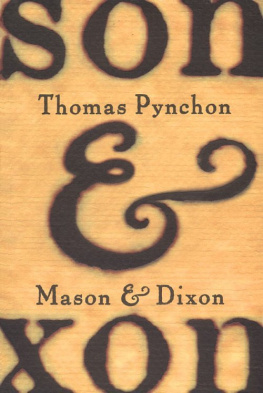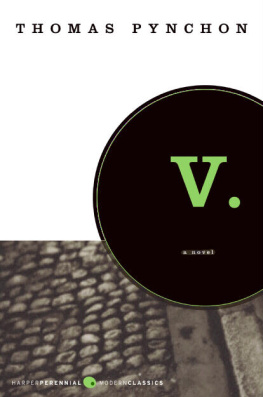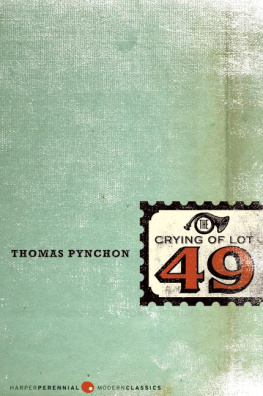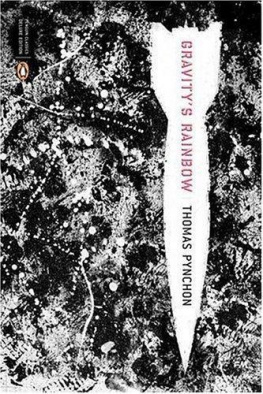James Gourley - Terrorism and Temporality in the Works of Thomas Pynchon and Don DeLillo
Here you can read online James Gourley - Terrorism and Temporality in the Works of Thomas Pynchon and Don DeLillo full text of the book (entire story) in english for free. Download pdf and epub, get meaning, cover and reviews about this ebook. year: 2013, publisher: Bloomsbury USA, genre: Art. Description of the work, (preface) as well as reviews are available. Best literature library LitArk.com created for fans of good reading and offers a wide selection of genres:
Romance novel
Science fiction
Adventure
Detective
Science
History
Home and family
Prose
Art
Politics
Computer
Non-fiction
Religion
Business
Children
Humor
Choose a favorite category and find really read worthwhile books. Enjoy immersion in the world of imagination, feel the emotions of the characters or learn something new for yourself, make an fascinating discovery.
- Book:Terrorism and Temporality in the Works of Thomas Pynchon and Don DeLillo
- Author:
- Publisher:Bloomsbury USA
- Genre:
- Year:2013
- Rating:5 / 5
- Favourites:Add to favourites
- Your mark:
- 100
- 1
- 2
- 3
- 4
- 5
Terrorism and Temporality in the Works of Thomas Pynchon and Don DeLillo: summary, description and annotation
We offer to read an annotation, description, summary or preface (depends on what the author of the book "Terrorism and Temporality in the Works of Thomas Pynchon and Don DeLillo" wrote himself). If you haven't found the necessary information about the book — write in the comments, we will try to find it.
James Gourley: author's other books
Who wrote Terrorism and Temporality in the Works of Thomas Pynchon and Don DeLillo? Find out the surname, the name of the author of the book and a list of all author's works by series.
Terrorism and Temporality in the Works of Thomas Pynchon and Don DeLillo — read online for free the complete book (whole text) full work
Below is the text of the book, divided by pages. System saving the place of the last page read, allows you to conveniently read the book "Terrorism and Temporality in the Works of Thomas Pynchon and Don DeLillo" online for free, without having to search again every time where you left off. Put a bookmark, and you can go to the page where you finished reading at any time.
Font size:
Interval:
Bookmark:
Terrorism and Temporality in the Works of Thomas Pynchon and Don DeLillo
By James Gourley

An imprint of Bloomsbury Publishing Plc
175 Fifth Avenue New York NY 10010 USA
50 Bedford Square London WC1B 3DP UK
www.bloomsbury.com
First published 2013
James Gourley, 2013
All previously unpublished material by Don DeLillo is reprinted with permission from the author.
All rights reserved. No part of this publication may be reproduced or transmitted in any form or by any means, electronic or mechanical, including photocopying, recording, or any information storage or retrieval system, without prior permission in writing from the publishers.
No responsibility for loss caused to any individual or organization acting on or refraining from action as a result of the material in this publication can be accepted by Bloomsbury Academic or the author.
Library of CongressCataloging-in-Publication Data
A catalog record for this book is available from the Library of Congress.
ISBN: 978-1-4411-0956-9
To Nikki
Contents
To my colleagues at the School of Humanities and Communication Arts, and the Writing and Society Research Centre at the University of Western Sydney, from who I received a great deal of support. Many thanks for the assistance, encouragement, and intellectual guidance provided by Chris Conti, Ben Denham, Gavin Smith, Michael Symonds, Marise Williams, Lorraine Sim, Chris Eagle, Gail Jones, Kate Fagan, and David McInnes. Jason Tuckwell proved a constant foil, engaging concepts in discussion and providing an example of intellectual rigor. Thank you to Chris Peterson, whose analysis of earlier versions of this work was of great assistance. And, of course, my complete gratitude to Anthony Uhlmann, whose clarity of mind and breadth of knowledge provided great assistance.
To my friends, who ensured I maintained perspective throughout the past four years. Special thanks must go to Nick Felton and Phil Horrell.
And to my family, who I cherish always. Thanks to John, Odette, Jackie, Lil, Leigh, Pete, Jo, and Pam.
Thomas Pynchons use of stylized ellipses throughout his novels creates difficulty in distinguishing authorial omissions in quotations. Pynchons ellipses relevant to a quotation have been included in their original form (...), while authorial omissions are indicated by an ellipsis in square brackets [...]. To maintain clarity, all authorial omissions from others works are also indicated by an ellipsis in square brackets.
The terrorist attacks on September 11, 2001, comprised the flying of American Airlines Flight 11 and United Airlines Flight 175 into the World Trade Center, American Airlines Flight 77 into the Pentagon building in Virginia, and a failed attempt upon a target in Washington, DC, in which the passengers and crew of United Airlines Flight 93 diverted the aeroplane from its intended target, which ultimately saw the aeroplane crash into farmland in Pennsylvania. The attacks resulted in the loss of almost 3,000 lives, including all 19 of the hijackers aboard the 4 flights. The terrorist attacks have become the focal point of American foreign policy in the twenty-first century and have heavily influenced the allied military action in both Iraq and Afghanistan. As such, the September 11 attacks stand as the conclusion of the twentieth century and the beginning of the twenty-first: the September 11 attacks transformed America, and the world, producing a new era in which the threat of guerrilla-style attacks upon Western sovereign nations became reality.
The September 11 attacks prompted a great outpouring of writing in many spheres, including philosophy and literature. Jacques Derrida called the September 11 events a trauma, though not as concerning as the threat that is worse and still to come While there are vast reservoirs of opinion on this topic, this book analyzes the effects of the September 11 attacks on the literary milieu of the United States. This is not to elide the importance of those dominating figures, or indeed of other viewpoints: my project simply focuses on the means through which American letters has attempted to grapple with these events. I will refer to philosophical and theoretical analyses of September 11, but my main focus will always be the literary response to September 11, with theoretical and critical works assisting my interpretive focus.
I have focused on two emblematic American authors, Thomas Pynchon and Don DeLillo, for a number of reasons. First, DeLillo and Pynchon are canonical authors of the twentieth century, and reflect the dominant cultural focus of their peers and of the American, and Western, literary scene. Secondly, both are longtime residents
This book returns repeatedly to the question of time; the most noticeable, but also the most logical change we can identify in the novels of both Pynchon and DeLillo after the September 11 attacks is a change in their conceptualization of time. This is what Shawn Smith calls the torturing of time [...] in narrative, to conform to a damaged perception of the world. Time is not only time as we perceive it in our world, but also the linear time of narrative, the concept of duration, but also, the time in which we live. Considering the multiplicity of ideas encapsulated within the concept of time and the obvious relationship between the September 11 attacks and a change in time, it is no wonder that DeLillo and Pynchon attempt to work through a reconsideration of time within their novels after September 11. What I will emphasize throughout, however, is that time is not only a concern for both authors after the September 11 attacks. Rather, what we can identify in their works is a change in the consideration and nature of time by comparing novels written both before and after the event.
DeLillos essay, In the Ruins of the Future, published less than two months after the September 11 attacks, provides an effective framework to introduce the many issues that the transformative events of September 11 have produced. DeLillo argues that America at the conclusion of the twentieth century had established itself as a technological, economic, and political powerhouse that was functioning permanently in the future. He writes:
Today, again, the world narrative belongs to terrorists. But the primary target of the men who attacked the Pentagon and the World Trade Center was not the global economy. It is America that drew their fury. It is the high gloss of our modernity. It is the thrust of our technology. It is our perceived godlessness. It is the blunt force of our foreign policy. It is the power of American culture to penetrate every wall, every home, life, and mind.
DeLillo lists precisely those elements that define the America that both Pynchon and DeLillo wish to critique, to analyze, and to reconsider. We can also see the beginning of DeLillos reconsideration of time. The concept of America living in the future is explored in his novel Cosmopolis, written before the September 11 attacks and published after. DeLillo argues that the catastrophic event changes the way we think and act, moment to moment, week to week, for unknown weeks and months to come, and steely years. It is precisely this pressure, the uncertainty surrounding time in the years after the September 11 attacks that is the focus of this book. It is neatly encapsulated in the title of DeLillos essay, in which the West is now in ruins, ruins that remain in the future, struggling against the push into the past DeLillo sees as the main aim of the September 11 attacks.
Next pageFont size:
Interval:
Bookmark:
Similar books «Terrorism and Temporality in the Works of Thomas Pynchon and Don DeLillo»
Look at similar books to Terrorism and Temporality in the Works of Thomas Pynchon and Don DeLillo. We have selected literature similar in name and meaning in the hope of providing readers with more options to find new, interesting, not yet read works.
Discussion, reviews of the book Terrorism and Temporality in the Works of Thomas Pynchon and Don DeLillo and just readers' own opinions. Leave your comments, write what you think about the work, its meaning or the main characters. Specify what exactly you liked and what you didn't like, and why you think so.

